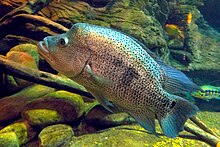| Parachromis dovii | |
|---|---|

| |
| Male Parachromis dovii at the Tennessee Aquarium | |
|
Scientific classification
| |
| Domain: | Eukaryota |
| Kingdom: | Animalia |
| Phylum: | Chordata |
| Class: | Actinopterygii |
| Order: | Cichliformes |
| Family: | Cichlidae |
| Genus: | Parachromis |
| Species: | P. dovii
|
| Binomial name | |
| Parachromis dovii (
Günther, 1864)
| |
| Synonyms [2] | |
| |
Parachromis dovii, the wolf cichlid, rainbow bass, or guapote, is a species of cichlid native to Central America, where it occurs in lakes, rivers and streams in Honduras, Nicaragua and Costa Rica. [1] It is one of the largest cichlids, reaching up to 14 kg (31 lb) in weight and 80 cm (2.6 ft) long. [3] A highly predatory species, it mostly feeds on other fish. [2] P. dovii is important to local commercial fisheries, is sought after as a gamefish, [2] and is sometimes kept in aquariums. [4]
Etymology
The fish is named in honor of John Melmoth Dow (1827–1892) of the Panama Railroad Company. As a ship captain and amateur naturalist, he collected the type specimen. [5]
As pets
Parachromis dovii is sometimes sought after by well experienced aquarists. While they are noted for their relatively high intelligence and lifespan of up to a few decades, they require special care due to their large size and high levels of aggression even by cichlid standards, meaning that few — if any — tank mates are possible. [4]
Conservation
Parachromis dovii is widespread in its native range and generally common. Although it has declined locally due to overfishing and pollution, it is not considered threatened. [1] It occurs in Costa Rica's Maquenque National Wildlife Refuge. [6] The species has been introduced to some locations in Central America where it is not native. [1]
References
- ^ a b c d Lyons, T.J.; Matamoros, W.A. (2020). "Parachromis dovii (Guapote)". IUCN Red List of Threatened Species. 2020: e.T159145817A159145827. doi: 10.2305/IUCN.UK.2020-2.RLTS.T159145817A159145827.en. Retrieved 27 March 2024.
- ^ a b c Froese, Rainer; Pauly, Daniel (eds.) (2023). "Parachromis dovii" in FishBase. February 2023 version.
- ^ "Parachromis dovii". Fishing World Records. 23 December 2023. Archived from the original on 27 March 2024. Retrieved 27 March 2024.
- ^ a b Chandler, Patrice (1 March 2024). "Wolf Cichlid: A Care Guide for the Ferocious Tropical Cichlid Species". Badman's Tropical Fish. Archived from the original on 27 March 2024. Retrieved 27 March 2024.
- ^ Christopher Scharpf & Kenneth J. Lazara (22 September 2018). "Order CICHLIFORMES: Family CICHLIDAE: Subfamily CICHLINAE (d-w)". The ETYFish Project Fish Name Etymology Database. Christopher Scharpf and Kenneth J. Lazara. Retrieved 5 January 2022.
- ^ Varga, Mauricio Salas (July 2008). Humedales de Ramsar (FIR) – Versión 2006-2008 (PDF) (Report) (in Spanish). Centro Científico Tropical. p. 20. Archived (PDF) from the original on 27 March 2024. Retrieved 27 March 2024.
| Parachromis dovii | |
|---|---|

| |
| Male Parachromis dovii at the Tennessee Aquarium | |
|
Scientific classification
| |
| Domain: | Eukaryota |
| Kingdom: | Animalia |
| Phylum: | Chordata |
| Class: | Actinopterygii |
| Order: | Cichliformes |
| Family: | Cichlidae |
| Genus: | Parachromis |
| Species: | P. dovii
|
| Binomial name | |
| Parachromis dovii (
Günther, 1864)
| |
| Synonyms [2] | |
| |
Parachromis dovii, the wolf cichlid, rainbow bass, or guapote, is a species of cichlid native to Central America, where it occurs in lakes, rivers and streams in Honduras, Nicaragua and Costa Rica. [1] It is one of the largest cichlids, reaching up to 14 kg (31 lb) in weight and 80 cm (2.6 ft) long. [3] A highly predatory species, it mostly feeds on other fish. [2] P. dovii is important to local commercial fisheries, is sought after as a gamefish, [2] and is sometimes kept in aquariums. [4]
Etymology
The fish is named in honor of John Melmoth Dow (1827–1892) of the Panama Railroad Company. As a ship captain and amateur naturalist, he collected the type specimen. [5]
As pets
Parachromis dovii is sometimes sought after by well experienced aquarists. While they are noted for their relatively high intelligence and lifespan of up to a few decades, they require special care due to their large size and high levels of aggression even by cichlid standards, meaning that few — if any — tank mates are possible. [4]
Conservation
Parachromis dovii is widespread in its native range and generally common. Although it has declined locally due to overfishing and pollution, it is not considered threatened. [1] It occurs in Costa Rica's Maquenque National Wildlife Refuge. [6] The species has been introduced to some locations in Central America where it is not native. [1]
References
- ^ a b c d Lyons, T.J.; Matamoros, W.A. (2020). "Parachromis dovii (Guapote)". IUCN Red List of Threatened Species. 2020: e.T159145817A159145827. doi: 10.2305/IUCN.UK.2020-2.RLTS.T159145817A159145827.en. Retrieved 27 March 2024.
- ^ a b c Froese, Rainer; Pauly, Daniel (eds.) (2023). "Parachromis dovii" in FishBase. February 2023 version.
- ^ "Parachromis dovii". Fishing World Records. 23 December 2023. Archived from the original on 27 March 2024. Retrieved 27 March 2024.
- ^ a b Chandler, Patrice (1 March 2024). "Wolf Cichlid: A Care Guide for the Ferocious Tropical Cichlid Species". Badman's Tropical Fish. Archived from the original on 27 March 2024. Retrieved 27 March 2024.
- ^ Christopher Scharpf & Kenneth J. Lazara (22 September 2018). "Order CICHLIFORMES: Family CICHLIDAE: Subfamily CICHLINAE (d-w)". The ETYFish Project Fish Name Etymology Database. Christopher Scharpf and Kenneth J. Lazara. Retrieved 5 January 2022.
- ^ Varga, Mauricio Salas (July 2008). Humedales de Ramsar (FIR) – Versión 2006-2008 (PDF) (Report) (in Spanish). Centro Científico Tropical. p. 20. Archived (PDF) from the original on 27 March 2024. Retrieved 27 March 2024.
